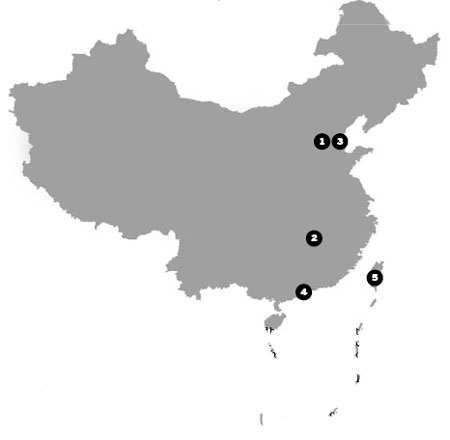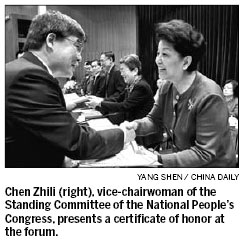IP Scene

1.Beijing
More grassroots inventors
Newly industrialized inventions have contributed greatly to the national goal of building an innovative country, Chen Zhili, vice-chairwoman of the Standing Committee of the National People's Congress, said in a speech at the opening ceremony of this year's Chinese Inventors Forum held last week in the capital city.
Chen then called for authorities to formulate more policies to encourage grassroots inventors.
Sixty winners of the Creative Founder Award were announced during the forum, with 10 of them named Present-Day Inventors for "outstanding achievements to society and the economy".
The awards were founded in 2005 by the China Association of Inventions to encourage commercialization of innovative ideas.
(xinhuanet.com)

Publishing in the digital era
Twelve scholars and business insiders from universities, companies and research organizations discussed the challenges and opportunities faced by traditional publishing in the digital age at a copyright forum held on May 9 and 10 as part of the 18th Beijing International Book Fair.
In a keynote speech, Wang Ziqiang, director of the copyright department at the National Copyright Administration, called for a wider international cooperation by Chinese publishing companies.
(China Press and Publishing Journal)
2.Hunan
Arrests for trade secrets theft
Three former employees of a company in Zhuzhou were arrested in early May for stealing trade secrets and causing a huge loss to their previous employer.
One of the men was an executive vice-manager in charge of daily operations at a company based in the industrial city Zhuzhou, while another headed its technology department and the third was part of the R&D team.
Based on its own intellectual property rights, the Zhuzhou company signed a contract with a Xinjiang firm in July 2008 to make water-cooled electrical reactors - large coils used to prevent short circuits - and after two years of effort, the reactors were ready for sale.
A Beijing buyer then ordered 174 of the new devices worth nearly 6 million yuan ($923,219). Eighty-five had been delivered by last October.
Yet the buyer then rejected the next delivery, claiming that the project was postponed.
As a result, a large number of electrical reactors were not shipped and had to be stored in a warehouse, causing a loss of more than 1 million yuan to the company.
After the Zhuzhou company initiated legal proceedings against its former employees, they admitted the real reason behind the rejected order was the three men used the same technology and produced reactors for another Beijing firm, which were then sold to the original buyer.
(jcrb.com)
3.Tianjin
3,000 student inventions
More than 2,000 students from primary, junior high and high school were granted nearly 3,000 patents last year, doubling the number awarded in 2009.
More than 95 percent of the inventions can be directly put to use in daily life, according to local authorities. Some 30 percent were new ways to save water or electricity.
A mini-water purifier designed by high school student Qi Hanxu uses natural minerals to absorb pollutants. Another student designed an electronic guide for the blind that uses solar energy and a voice navigation system.
The patents reflect efforts by city governments to establish model schools, train teachers and organize invention contests to encourage interest in innovation.
(enorth.com.cn)
4.Guangdong
New ultra-scope invented
A scope that uses ultrasound to examine and treat the gall bladder - the first of its kind in the nation - was recently invented at No 2 Hospital of Panyu district, Guangzhou.
The patented device can find tiny gallstones often missed by surface ultrasound, said its inventor Qiao Tie, director of the hospital.
The new device penetrates the gall bladder and provides a clearer view, he said.
(Science and Technology Daily)
5.Taiwan
More cross-Straits trademarks
Chinese mainland companies have now registered 7,000 trademarks in Taiwan, according to Fu Shuangjian, deputy director of the State Administration for Industry and Commerce.
But the number pales compared to the 90,000 trademarks Taiwan-based companies have registered on the Chinese mainland, Fu said at this year's Cross-Straits Trademark Forum that opened on May 10 in Taipei.
"The cooperation agreement on cross-Straits intellectual property protection signed last year has served as a good communication channel," he said.
"Both sides have made great improvements in fighting counterfeits, malicious trademark registration and protection of well-known brands."
Representatives from intellectual property departments, companies and associations also delivered speeches.
(xinhuanet.com)
(China Daily 05/18/2011 page17)














